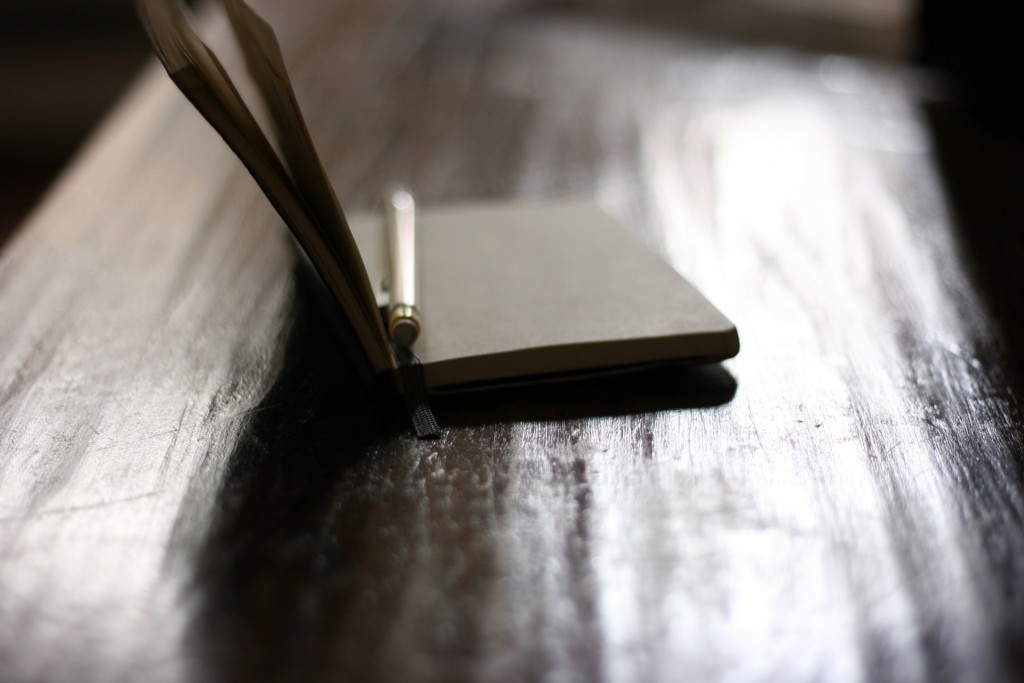Today’s post comes from Reem Al-Omari, a journalist and aspiring fiction writer. Thanks, Reem!
I was riding in the car with my sister-in-law recently. She was driving.
As we waited to turn left at an intersection, and David Byrne crooned about it being the “same as it ever was,” I looked at the car next to us and noticed something strange, an optical illusion.
The driver of the maroon Honda sedan was a little old lady. She wore one of those black sunglasses that wrap around for complete protection from the sun, and a pure white head of hair fashioned in that perm that grandmas love to don.
With her, were six kids, all preteens. Two of them were in the front, one in the lap of the other. From my angle, for a split second before the arrow turned green and the car began to move, it looked as though conjoined twins were in the passenger seat.
I knew it was two girls, one sitting in the lap of the other, but for a moment, my mind wandered someplace far away. I wondered, “Has a cop ever pulled a car over that looks like it has two people unsafely sitting together in the passenger seat, and finds that it’s just one person with two heads?”
I asked my sister-in-law this question for the sake of making interesting conversation, and after furrowing her eyebrows and saying that she never thought like that, she went on to say, “You really have a writer’s mind.”
I thanked her.
Between you and me, this compliment, this reassurance, could not have come at a better time, because I asked my actual sister a week before, in a late-night conversation, what images come into play when she hears someone labeled a writer.
“The movie, Her Alibi,” was her reply to the question. All I could remember of this eighties movie was the font of the title in old-school typewriter, and Tom Selleck’s voice narrating the story in first person.
“The office is in the attic, and his desk is facing the window,” she said. “The walls are white. And he’s kind of anal. And each word said is something for him to ponder and use. He is also like a shrink, but not for anyone but himself. He doesn’t solve problems, or ask questions, but just listens and records mentally what is said to use later. I don’t like talking to writers, actually, because of that. Writers also prefer certain paper, and pens, they’re picky about their pens. They’re anal and weird.”
“Weird in what sense?” I asked.
“Well, they’re quiet and they don’t like to talk to anyone. It’s not easy for them to make friends,” she said with some strain, I guessed to find the right words to say what she meant.
“Okay,” I said calmly, mesmerized.
“The possibility of a writer being anal is much higher than in any other profession,” she continued.
“So, you picture a writer as someone not social?” I asked.
“Yes,” she said without pause and I sat up straighter, prouder.
“And everything about writers is classic,” she continued. “Their clothes, their hair, their house… it’s more classic than trendy or loud.”
“Do you think these are bad qualities in a person?” I asked, letting the reporter in me take charge of this casual conversation. I even had to record it.
“No,” she said casually.
And then I asked the hardest question for me to have answered. “Do you think that I am like that? I mean, all of these characteristics you described, do you see them in me?”
Once again, she said no.
“So, I’m not a writer,” I hear myself say on the voice file, sounding disappointed, beaten down.
“No, I think that the difference is you’re not writing a book. You’re first of all an editor, you deal with things that have already been written, and even when you write, it is short pieces, which are articles.”
“Yes, but—,” I said with a stammer, “but I want to be the kind of writer you’re talking about. I want to write fiction. It’s what I work on every day.”
She told me to calm down, but I couldn’t.
“Well, I mean, you’re basically telling me that I am not what you—“ I began to say, when she interrupted me.
“I’m just saying this is my idea of a writer.”
“Would you describe me as a writer?” I asked, finally.
When she said no, I asked: “Then what do you see me as?”
“You’re more of an editor, or journalist,” she said. “I mean, you haven’t written a book. To me, Danielle Steel is a writer.”
And that was when I rolled my eyes and stopped recording, knowing that I had all the real answers to all my questions, all along.
Editor’s Note: What stereotypes or misconceptions of writers have you encountered? Do you think your friends and family see you as ‘a writer?’ Why or why not?
Reem Al-Omari holds a degree in Journalism, but over the years has leaned more toward fiction as her true passion. You can follow her on Twitter and read her contributions at Intrepid Media .
